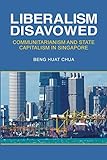Liberalism Disavowed : Communitarianism and State Capitalism in Singapore / Beng Huat Chua.
Material type: TextPublisher: Ithaca, NY : Cornell University Press, [2017]Copyright date: ©2017Description: 1 online resource (234 p.)Content type:
TextPublisher: Ithaca, NY : Cornell University Press, [2017]Copyright date: ©2017Description: 1 online resource (234 p.)Content type: - 9781501713446
- 9781501713453
- 320.95957 23
- online - DeGruyter
| Item type | Current library | Call number | URL | Status | Notes | Barcode | |
|---|---|---|---|---|---|---|---|
 eBook
eBook
|
Biblioteca "Angelicum" Pont. Univ. S.Tommaso d'Aquino Nuvola online | online - DeGruyter (Browse shelf(Opens below)) | Online access | Not for loan (Accesso limitato) | Accesso per gli utenti autorizzati / Access for authorized users | (dgr)9781501713453 |
Frontmatter -- INTRODUCTION -- Chapter 1. CONTEXTUALIZING SINGAPORE -- Chapter 2. SINGAPORE STATE FORMATION IN THE COLD WAR ERA -- Chapter 3. LIBERALISM DISAVOWED -- Chapter 4. DISRUPTING PRIVATE PROPERTY RIGHTS -- Chapter 5. DISRUPTING FREE MARKET -- Chapter 6 GOVERNING RACE -- Chapter 7. CULTURAL LIBERALIZATION WITHOUT LIBERALISM -- CONCLUSION -- BIBLIOGRAPHY -- INDEX
restricted access online access with authorization star
http://purl.org/coar/access_right/c_16ec
In Liberalism Disavowed, Beng Huat Chua examines the rejection of Western-style liberalism in Singapore since the nation’s expulsion from Malaysia and formal independence as a republic in 1965. The People’s Action Party, which has ruled Singapore since 1959, has forged an independent non-Western ideology that is evident in various government policies that Chua analyzes, among them multiracialism, public housing, and widespread social distributions to the citizenry. Singapore is prosperous and peaceful, it’s highly advanced on various metrics of economic development, it has a great deal of regional influence, it is home to sophisticated industries and a large financial service sector, and it features what are by Western standards unusually low levels of social inequality. Paradoxically, however, it is no beacon of political liberalism. Chua sets forth ample evidence that the dominance of the People’s Action Party is based on a combination of economic success and media control, limits on public protests, libel suits against political opponents, and severely curtailed civil liberties.
Mode of access: Internet via World Wide Web.
In English.
Description based on online resource; title from PDF title page (publisher's Web site, viewed 03. Jan 2023)


